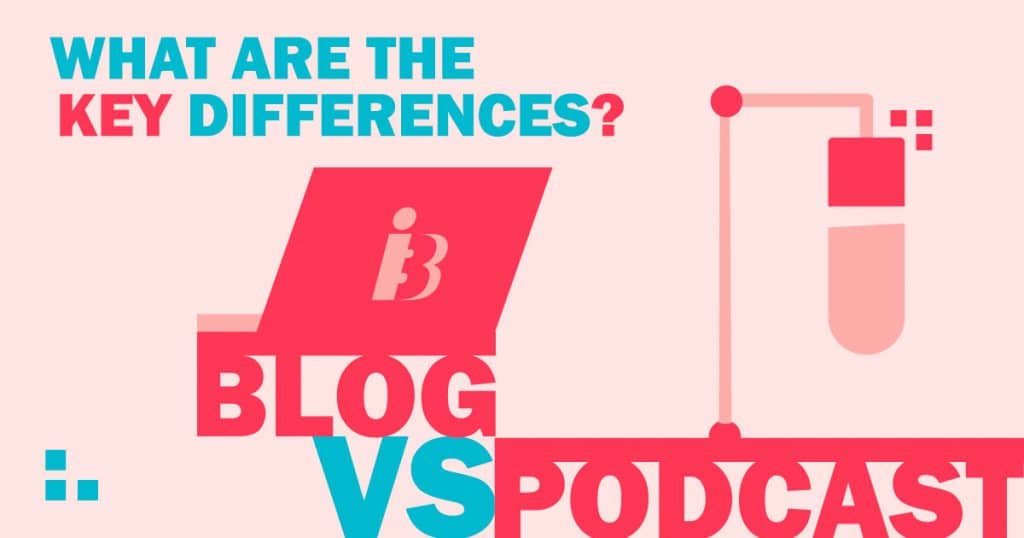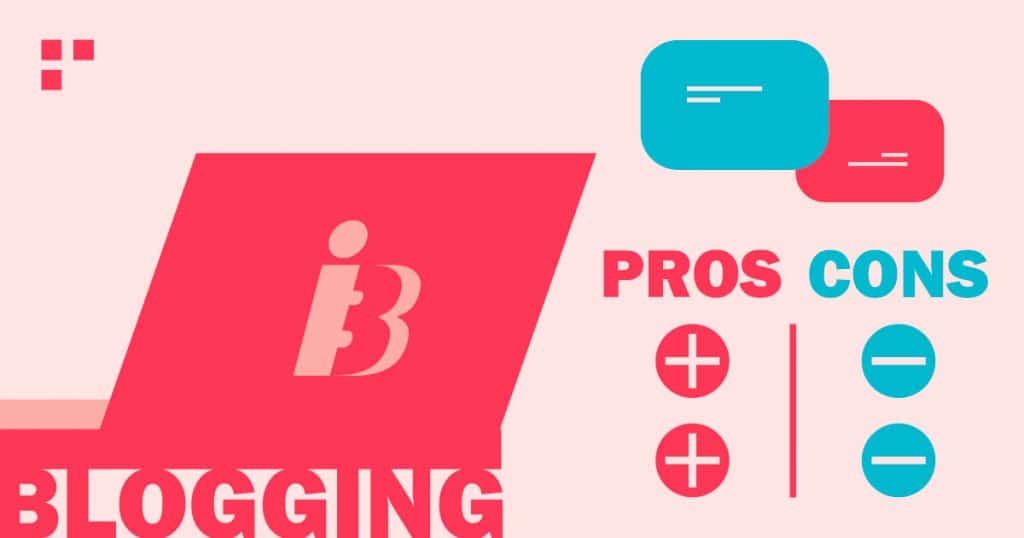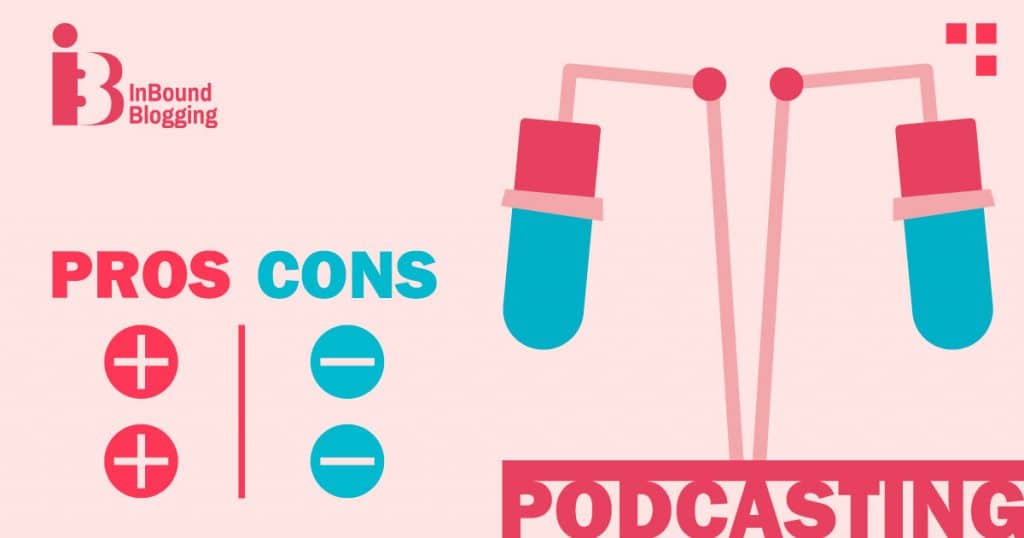Are you torn between creating a blog or a podcast? Blogs and podcasts are powerful social media tools, nurturing customer relationships, deepening brand loyalty, and generating quality leads. However, each has its upsides and downsides.
Now you might be wondering: Which is the best choice for my business?
Blogs and podcasts sometimes boast the right blend of content marketing. But they differ regarding the techniques, equipment, and skills involved.
Some sobering blogging statistics reveal the following:
- 59% of B2B marketers consider blogs valuable marketing channels, responsible for about 434% of indexed pages on Google.
- 56% of marketers say blogging is effective as it generates the most significant return on investment (ROI).
- WordPress users create almost 70 million new blogs monthly, with an additional 77 million comments. This stat speaks volumes about blogging.
As for podcasts:
- About 33% of young Americans (from age 13) listened to podcasts regularly.
- 40% of Americans (from millennials to Gen X) listened to a podcast monthly.
- The heaviest podcast listeners are most engaged when away from home.
Blogs make for great inbound marketing tools. In contrast, podcasts can help you garner massive excitement across your industry.
This post will focus on blogs and podcasts — what they are, their perceivable differences, and which is the perfect choice for your business.
1. What’s the Difference Between a Blog vs Podcast

A blog is a specific type of website, and it’s regularly updated with new content. Think fiction pieces, poems, articles, or news stories.
If you’re using a blog for personal or business use, odds are, you’ll write boatloads of engaging articles to help draw in potential customers.
To start a blog (and make money blogging), you need a web hosting account.
With a well-established blog, you can:
- Cultivate an online community
- Become an expert in your industry
- Attract visitors to your site and turn them into potential customers
On the other hand, a podcast is a series of regular online episodes and spoken word, all focusing on a specific theme or topic. A podcast can have a website, but it’s not a requirement to run a successful online business.
You can access podcasts via popular services such as Stitcher, Spotify, and iTunes. Remember that you’ll need a podcast hosting platform to start a podcast.
With a podcast, you can:
- Share ideas, thoughts, and solutions with your audience
- Build authority and credibility with potential leads
- Grow your business brand online
Blogs (often written) are different from podcasts (usually spoken).
2. What Are Some Examples of Successful Blog Posts and Podcasts?
Some businesses strike the perfect balance between blogging and podcasting. A good example of exactly this is Daren Rowse. His Problogger platform has both a podcast and a blog.
Another example is Michael Hyatt. The high-achieving leadership expert runs two podcasts and a blog on his site. The two podcasts “Lead to Win” and “Focus on This” have cultivated a legion of fawning fans over the years.
For the record, both Michael and Darren first created their blogs before jumping head-first into podcasting. An approach that has worked out for them.
So, should you do the same? It depends on your business goals and needs. After all, both have their fair share of benefits and disadvantages.
3. Blogging Pros and Cons

A blog might be the best option for you if these reasons are music to your ears.
Blogging is a great way to boost your SEO efforts
Blogging is all about creating words. Eloquent writing packaged into a well-optimized blog can increase your Google ranking. But the same can’t be said of podcast episodes. When people use search engines to find information or answers to their questions, blogs often appear in search results. This visibility helps you attract a broader audience and drive traffic to your website.
Great inbound leads strategy
Blogging is the best inbound marketing strategy. It helps build lasting relationships with potential customers by attracting them to your business — through video marketing, social media, content marketing, SEO, and more.
In addition, blogging allows you to continuously update and refine your content to align with changing trends and audience preferences. This adaptability can be a significant advantage in staying relevant and appealing to your target audience over time.
Builds authority and credibility
Captivating blog posts can keep you in front of your audience and establish your authority in the space. Podcasting falls short in this area. So, leverage blogging to grow and scale your online business. Consider using blog posts to share your expertise, showcase your thought leadership, and gain credibility within your industry, all of which can be powerful for your business growth.
Strong competition
Compared to podcasting, blogging is highly competitive. Blogging also takes more work than most people are willing to commit to. As the competition is much more robust in blogging than in the world of podcasts, it takes a massive effort to stand out.
Strong copywriting skills
Blogging requires refined writing skills. You have to be a great copywriter to stay competitive. Which is not as easy as it sounds. You need to be armed with a vast vocabulary, adjectives, grammar, etc. None of that is essential in podcasting. To find your footing in the competitive blogging community, you’ll need to consistently produce high-quality content, develop a unique voice, and engage with your audience effectively.
It requires strong SEO knowledge to succeed
For a blog to succeed, it needs strong SEO knowledge. This means optimizing your blog according to the latest Google updates to rank higher on search engines. When done correctly, SEO can help people find and read your blog. Bloggers should know how to optimize their content with meta tags, headings, and keyword-rich content, which are essential components of search engine optimization.
4. Podcasting Pros and Cons

A podcast might be for you if these reasons resonate with you.
You want to look professional (on a budget)
Creating a podcast is cost-effective. You need to spend some money on a high-quality podcast microphone and you can even rent a recording studio to look professional, but this is optional. However, a small room (think a guest room) can still get the job done. Strategic soundproofing and good editing software can also help enhance audio quality on a budget.
Connection and building relationships
Podcasts give an audience a chance to hear your voice. Your tone, laughter, and the way you speak make your audience feel closer to you than if they had only read words in a blog. Plus, listening to an hour-long podcast episode in one sitting is easy.
Less competition, low saturation
What makes podcasting far more favorable is less competition. There are more blogging sources than there are for podcasting. So instead of competing with about 700 bloggers, you’re much better off competing, for instance, with six podcasters.
Podcasting is a long game
Cultivating a community through podcasting can take time. It’s hard to build a podcast and grow an audience immediately. So, be warned: growing a podcast audience (much like a YouTube channel) is a slow-paced journey.
Podcasts take time to create
Producing episodes can take a whole day, or even more, of recording. Never mind having to send the episodes for editing before making the final cut. It’s a tedious and time-consuming process to create a podcast episode. A podcast is like your own online radio where you get to be the host, sound engineer, and producer, which can be overwhelming.
Tracking performance is tricky
Measuring podcast performance remains a significant challenge. That’s because podcasts are downloaded to users’ devices for future listening.
There’s little data to track a podcast’s performance. For a blog, it’s easy as it relies on robust analytics platforms to deliver consistent key performance indicators (KPIs).
5. Which Is Better for Your Business: Blog or Podcast?
Creating a blog is the best way to build a profitable online business.
Compared to podcasting, blogging is the easier and more accessible way to launch your business and generate a (consistent) income online.
The best part? You can launch a blog from anywhere in the world.
Furthermore, you don’t need to be a web developer or professional writer. A degree, years of experience in your field, or credentials aren’t necessary for starting and running a blog.
Before you decide to start a blog, focus on the following questions:
- What do you want to blog about?
- How will you structure your blog?
- Do you have enough ideas for a blog about your great idea or subject?
- How will you optimize your blog? Is using SEO a critical focus for your business?
- Which web hosting account is best for starting your blog?
Answering these and many more related blogging questions will help you start a blog and learn how to make money through blogging.
FAQ:
Still curious? Here are a few frequently asked questions.
1. Are podcasts or blogs more popular?
Compared to the past two decades, blogging has become less popular.
More people are drifting towards podcasting. However, this doesn’t mean that blogging has lost its relevance. Blogs are still practical digital marketing tools.
2. Which makes more money, a blog or a podcast?
Podcasts attract high-value, dedicated listeners. For this reason, it pays more per viewer than blogs or social platforms like YouTube. However, there’s a blog vs. podcast income caveat to be aware of: don’t expect to make money fast with a podcast, especially when starting.
3. Is a podcast a type of blog?
To settle the audio blog vs. podcast debate: A series of podcasts can become an audio blog. However, podcasting doesn’t include audio blogging. More specifically, an audio blog is a blog consisting of sound files, and it’s not the same as a podcast.
4. Can I do both a blog and a podcast?
Absolutely! Many content creators have both a blog and a podcast. This allows them to reach a wider audience and cater to different preferences. You can repurpose your blog articles into audio content or vice versa.
5. How do I choose a target audience for my blog or podcast?
Choosing a target audience for your blog or podcast involves researching and understanding your niche. Build an audience by identifying their needs and interests, and creating content that resonates with people. Consider the demographics, interests, and pain points of your ideal followers to provide value to them.
6. Can I monetize my blog or podcast?
Yes, you can monetize both a blog and a podcast. Blog content monetization can be done through various methods such as affiliate marketing, sponsored posts, advertising, selling digital products or services, and more. Podcast monetization options include sponsorships, advertising, listener donations, selling merchandise, and offering exclusive content.



